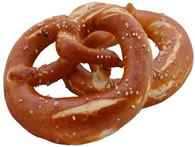Untitled Document

|
Bread
Bread dates back over 10,000 years when people began harvesting grains for food. These grains were ground down and mixed with water to make a porridge. Later, the porridge was baked on hot stones or in ashes to make flat breads.
Bread making changed completely with two discoveries.
(1) Surrounding bread with heat (as opposed to just cooking it on stones) allowed round loafs to be baked. This led to the invention of ovens.
(2) Allowing the bread dough to stand for several days attracted yeast to the dough, which made the dough rise. This resulted in lighter more airy breads to be developed.
In Germany, bread is more than just a food - it is a part of the German culture. Germany produces more varieties of breads than any other country. Over 300 varieties of dark and white breads and over 1,200 varieties of rolls and mini-breads (Brötchen & Kleingebäck) are produced in Germany.
Bread makes up a large part of the German cuisine. It is the basis of both the morning and evening meals and its influence stretches into holiday celebrations and festivals. For breakfast, rolls and mini-breads (Brötchen & Kleingebäck) are most common and are accompanied with other German favorites, such as butter, hard-boiled eggs, wurst and cheese. The evening meal (Abendessen) is often a light meal, as Germans traditionally eat their large, hearty meal at mid-day. Like breakfast, the evening meal often consists of bread slices served with wurst, cheese, and/or vegetables. At festivals, the most common breads are the pretzel and rolls and mini-breads (Brötchen & Kleingebäck) served with bratwurst. For holidays, specially shaped breads are baked. |
 |
| Photo: © milosluz - Fotolia.com |
|
| |
|
 |
Germany is a "bread country" where bread is more than just food - it is part of the culture. Learn about well-known German breads: ingredients, history, our serving suggestions, and lots more!
|
Continue »
|
|
|
 |
| In German bread baking, there are seven categories of breads, based on ingredients and bread shape. Learn about each category here and search our bread database for breads of each category. |
| Continue » |
|
|
 |
In Germany, flour is designated by number, representing the amount of ash found in 100 grams. Here we provide the common flours used in german baking along with the U.S. equiavalent.
|
| Continue » |
|
|

Photo: © Jerusha - Fotolia.com |
|
| |
|
|

